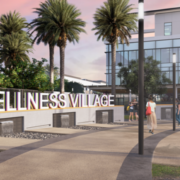Substance Use Disorder Treatment Facilities Attracting Investors
With funding support from the federal government and the growing need for mental health facilities nationwide, this niche commercial real estate sector is evolving and emerging as a viable investment opportunity, including drawing the attention of REITs.
The Substance Abuse and Mental Health Services Administration noted in a 2021 survey that nearly 1 in 4 adults 18 and older, and 1 in 3 among adults aged 18 to 25, had a mental illness in the past year.
“The fastest growing sector in this asset class has primarily been the substance use disorder treatment facilities,” writes Justin Butler, leader of the Healthcare Valuation Practice Group for Colliers.
Most facilities that treat substance abuse disorder are not purpose-built, according to Butler, and many are adaptive reuses of nursing homes, assisted living facilities, hospitals, schools, large homes, and sometimes even apartments and office buildings.
“The behavioral health industry is currently riding a hot wave in terms of funding from the federal government,” Doug King, Vice President and Healthcare Sector Lead at Project Management Advisors, tells GlobeSt.com. “While this could always turn around if the political winds shift, it’s great to see so many behavioral health and addiction centers opening in communities across the country right now.”
Unlike other medical facilities, which often require specialized technology and higher power needs, behavioral health clinics have about the same requirements as the average office, albeit with the addition of specialized anti-ligature devices and additional surveillance for patients of higher acuity, according to King.
“When looking to lease space for behavioral health centers, the ideal clinic should be located in a centralized place that’s easy to get to on public transportation,” King said. “Especially for behavioral health clinics that focus on addiction, it’s important to find a property with space for socialization, which can be essential for recovery. That’s why we see a lot of behavioral health clinics feature outdoor areas (as many patients are smokers), cafes, and even diners where patients can mingle with each other before and after treatment.They also need to be designed with mental health in mind — lots of natural light, comfortable seating and biophilia, and an array of private areas to accommodate different kinds of patients.”
When it comes to adaptive reuse, one area of opportunity for the CRE industry is the conversion of former retail properties in strip malls and downtown areas into behavioral health centers, King said.
“Not only are these spaces already sufficiently embedded into the community, but they also have enough space for clinics to expand and partner with other community organizations, such as medical nonprofits and housing programs,” said King.
Avison Young’s Brooks Hauf tells GlobeSt.com he has seen an increase in the demand for behavioral health services nationwide.
“The largest challenge for the sector is staffing related as the supply for talent is more specialized and not as deep as other labor sectors,” Hauf said. “With demand for behavioral health services expected to continue, staffing will remain very competitive and will drive decision-making on specific locations that have deeper talent pools.”
Butler said the costs for purpose-built facilities compared to adaptive reuse are considerable, and the increased cost often doesn’t provide comparable increased utility. However, there have been purpose-built facilities in operation.
Sale leaseback transactions generally see year-one yields in the 8% to 10% range, Butler said, but this can vary above and below that based on rent levels, tenant strength, quality of the real estate, and location. Rents are commonly in the $30 to $40 PSF NNN range, and many operators can afford rent at these levels, according to Butler.
“We would expect to see more purpose-built facilities, as well as larger operators with national networks and in-network insurance relationships,” Butler said. “There already have been some publicly traded healthcare and net lease REITs that have been purchased these facilities, “and we would expect that to continue.”
Source: GlobeSt.










